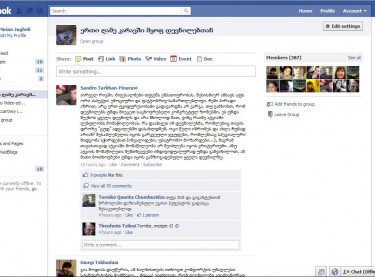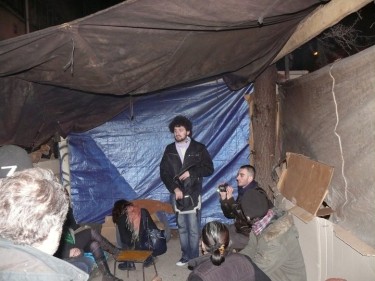This post is part of our special coverage Caucasus Conflict Voices.
Four months ago, on 11 October 2010, Internally Displaced Persons (IDPs) who fled the wars over the breakaway regions of Abkhazia and South Ossetia began to protest government indifference towards them. Tented in the yard of the Ministry of IDPs from the Occupied Territories, Accommodation and Refugees of Georgia, several IDPs have been demanding that the government halt evictions, which have so far seen over 80 families removed from temporary accommodation, and to provide them with proper housing.
However, not a single official has come to talk to them about these issues and their concerns that alternative accommodation offered by the government is located in villages isolated from regional centers and which lack proper schools and hospitals. Online publications such as EurasiaNet have already reported about conditions in such locations, noting that the new housing often lacks windows and basic amenities such as water, electricity and gas.
As a result, bloggers Besik Liparteliani and David Chikhladze have created a Facebook group called One night in a tent with IDPs, attracting 387 people in one week.
Every night approximately 3-5 bloggers stay in a tent with IDPs. They bring food, clothing and medicines with them, writing their impressions and posting them online when they return home.
So far, solidarity from the bloggers has only received exposure from the online media with Netgazeti [GE] regularly reposting their impressions, Liberali [GE] featuring it, and major online TV outlet itv.ge reporting in video [GE].
One of the bloggers involved in the action, Lilac.ge [GE] writes:
უკვე 4 თვეა ასე, ღია ცის ქვეშ ცხოვრობენ და არც იციან, ამას ბოლო როდის მოეღება. ხანდახან ძალიან შიათ, ამ დროს კი ”ლტოლვილთა და განსახლების სამინისტროს” თანამშრომლები საკვები პროდუქტებით დატვირთულები მშვიდად და გულგრილად უვლიან გვერდს.
შეშა არ ყოფნით, კარვებში წვიმა ჩასდით, მათი მინისტრი კი შორიდან უთვლის: ”არაუშავს, არც ისე ცივი ზამთარიაო”.
Indeed, Gabo.ge [GE] writes about the case of one woman who killed herself in desperation.
4 თვის განმავლობაში ამ საპროტესტო აქციის შესახებ მწირი ინფორმაცია ვრცელდებოდა. ეს ფაქტი მედიასაშუალებების ყურადღების მიღმა დარჩა. მიუხედავად იმისა რომ მოხდა ერთი უბედური შემთხვევაც. სამინისტროს მხრიდან გულგრილი დამოკიდებულების გამო ერთმა ქალბატონმა თავი ლტოლვილთა და განსახლების სამინისტროს ეზოში დაიწვა და 25 დღის შემდეგ გარდაიცვალა.
Blogger Tiko Gabunia [GE] also writes about the conditions of IDPs.
არის დევნილი, რომელსაც ორივე ფეხი ომში აქვს დაკარგული, ერთ ბატონს ცალ ფეხში ძვლის მაგივრად რკინა აქვს(დანარჩენები ამბობენ, რომ ღამე ეყინება, პარკებს იხვევს და ჩანთაში დებს). კარგ მდგომარეობაში ნამდვილად არც ერთი მათგანი არ არის, მაგრამ ზოგის მდგომარეობა გაუსაძლისია.
ღამით გავიგეთ, რომ ყველა კარავში წყალი ჩადის. ასევე, არ აქვთ საკვები, საჭიროებენ ჰიგიენურ ნივთებს, შეშას (შეძლებისდაგვარად იქნებ დავეხმაროთ).
Vakhushti Menabde [GE] writes about the desperation and hopelessness in the IDP camp.
უკვე რამდენიმე საათია აქ ვართ და პირველივე, რაც შევნიშნე სრული უიმედობაა. დევნილებს არ სჯერათ რომ მათი ბედი ვინმეს ანაღვლებს. ყოველდღე უყურებენ სამინისტროს თანამშრომლების ნაწილის (თავად ასე ამბობენ) ცინიკურ დამოკიდებულებას, გული წყდებათ, რომ ნაციონალური მედია არ აშუქებს მათ პრობლემას. მათ შესახებ რამდენიმე კვირის წინ გახდა ცნობილი, არადა უკვე მეოთხე თვეა აქ არიან. აღარც უფლებადამცველი ორგანიზაციების სჯერათ, არც საერთაშორისოების.
Meanwhile, it should be noted that in the fall of 2008 at a donor conference in Brussels $4.5 billion was raised, of which €74.5 million ($102.7 million) was earmarked for housing displaced persons. The European Commission also allocated €51 million ($70.3 million) in the summer of 2009 for the permanent housing of IDPs. (source). Amnesty International has also issued a statement urging the Georgian government to comply with international standards on eviction.
Global Voices will continue to cover the protest and updates will be posted shortly.
This post is part of our special coverage Caucasus Conflict Voices.









1 comment